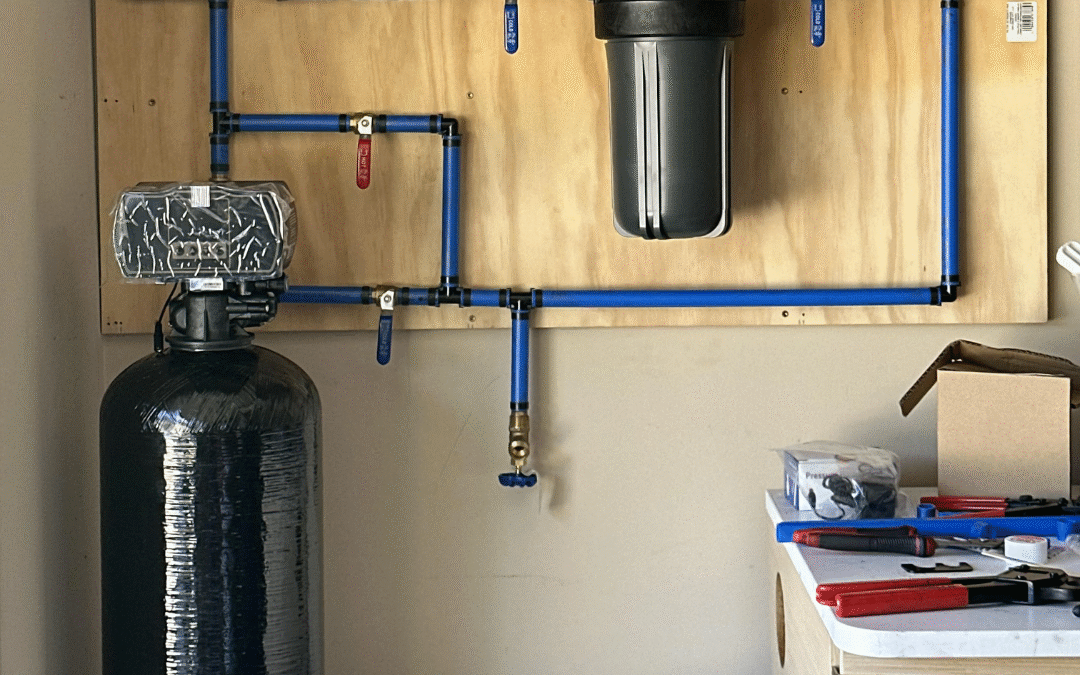If your faucets are crusty, your water pressure is dropping, or your appliances just don’t seem to last like they used to, the culprit could be hard water. And in Northern Kentucky and Greater Cincinnati, hard water is very common.
You might not be able to see it—but over time, hard water can do serious damage to your home’s plumbing system and your wallet. In this post, we’ll show you how to spot the signs, why hard water is such a headache, and what you can do to stop it in its tracks.
Table of Contents
What Exactly Is Hard Water?
Hard water is water that’s rich in minerals—mainly calcium and magnesium. While these minerals aren’t harmful to drink, they are rough on your pipes, fixtures, and appliances.
Most homes in Boone County and surrounding areas sit on limestone-rich soil, which means your water is naturally picking up minerals as it flows to your tap. The result? Buildup, inefficiency, and damage that adds up over time.
Signs You’re Dealing with Hard Water
Not sure if hard water is behind your plumbing issues? Here are some telltale signs:
- White or chalky residue on faucets and shower heads (aka limescale)
- Low water pressure, even if your pipes are clear
- Frequent clogs or slow drains
- Spotty dishes and dull-looking laundry
- Dry skin or brittle hair after showering
- Appliances wearing out early—especially water heaters and dishwashers
If these sound familiar, don’t worry—you’re not alone, and there are solutions.
How Hard Water Wrecks Your Plumbing Over Time
Hard water doesn’t cause problems overnight. It’s the silent, sneaky kind of issue that builds up slowly—and causes:
- Pipe blockages: Mineral buildup narrows your pipes, reducing flow and increasing pressure.
- Appliance breakdowns: Water heaters, dishwashers, and washing machines work harder and wear out faster.
- Increased energy bills: Limescale insulates heating elements, forcing them to run longer and harder.
- Leaks and corrosion: As minerals accumulate, joints and valves weaken, leading to more frequent leaks.
It’s like cholesterol in your plumbing system—it builds up quietly, and eventually, something bursts.
Here’s How to Protect Your Home (and Save Your Plumbing)
You don’t have to keep living with hard water. Here are proven solutions:
1. Install a Water Softener
This is the gold standard for hard water protection. A softener removes calcium and magnesium and replaces them with sodium or potassium, keeping your water gentle on your pipes.
- Prevents limescale buildup
- Extends the life of your plumbing and appliances
- Improves water quality, skin feel, and laundry results
Need help choosing the right system? Our team can size and install a system tailored to your water usage and household size.
2. Schedule Regular Plumbing Maintenance
Even with a softener, it’s smart to inspect your plumbing annually. We’ll check for mineral buildup, flush your water heater, and keep your pipes flowing freely.
3. Use Descaling Cleaners
Short-term fix: clean showerheads and faucets with vinegar or limescale removers. This won’t solve the root issue—but it’ll help for now.
4. Replace Damaged Pipes If Needed
If the damage is already done, we can recommend modern, scale-resistant piping materials like PEX that perform better long-term.
Don’t Let Hard Water Shorten the Life of Your Home
Hard water isn’t just a nuisance—it’s a plumbing problem that gets worse the longer you ignore it. At A+ Plumbing, we help Northern Kentucky and Greater Cincinnati homeowners install water softeners, protect their plumbing, and reduce costly repairs down the line.
Call 859-212-6803 to schedule your water softener consultation
Visit maximumplumbingky.com
Find us on Google Maps
We proudly serve Florence, Hebron, Union, Crescent Springs, Covington, West Chester, and nearby areas. Let us help you get back to clear water, strong pressure, and peace of mind—with A+ Quality Guaranteed.

